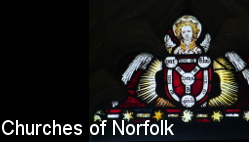| |
|
St Mary,
Great Yarmouth
 |
|
It
was the Historic Churches bike ride day of 2010,
and it had started to rain. This didn't bode
well, of course, but I was in Great Yarmouth, and
didn't know that a few miles inland the villages
were bathing in autumn sunshine. I still had
memories of the 1995 bike ride I'd completed in
near-monsoon conditions. I was leaving St Paul's
in Great Yarmouth's Newtown suburb, and the
logical next stop was St Mary, so I pelted down
Great Yarmouth's long, straight and aptly-named
Nelson Road as the rain intensified. I turned
into the pedestrian precinct of Regent Road and
hurriedly locked my bike up against the fence. Here,
tightly hemmed in among Yarmouth's jauntiest tat
shops, is St Mary, its great west tower lifting
familiarly above the aisles, clerestory, nave and
chancel. The shape and setting is typical of
small-town East Anglia - the Perpendicular
self-confidence of the late medieval Anglican
parish churches of old England. Except that St
Mary is, in fact, a Catholic church, and the
building is of course wholly Victorian. As I
arrived, Mass was just beginning, which seemed at
the very least a good excuse to sit out of the
rain for half an hour or so, and who knows? it
might even lift me for my onward journey. There
were about a dozen people in the congregation,
fairly typical for a Saturday morning Mass I
imagine, but the curiosity was that St Mary feels
a lot inside like it looks outside, a typical
CofE medieval church. It did seem strange to be
sitting there listening to the English Mass in
such a space.
|
As it
turned out, St Mary wasn't actually taking part in the
Historic Churches bike ride, but they were taking part in
Open Heritage weekend, so they were quite happy for me to
potter about after Mass taking photographs while
everybody else busied themselves dusting, hoovering,
polishing and sweeping - it seemed that just about
everybody who had attended Mass had a job to do.
The
atmosphere inside the church is of a dignified grandeur,
and one of the main reasons is the interesting range of
glass, ranging from the 1850s up to the late 20th
Century. A sequence of uncharacteristically good glass by
Mayer & Company depicts pairs of Saints. A Geoffrey
Webb window depicts scenes from the life of Christ, and a
glorious Annunciation window in what appears to be the
Kempe & Co style is probably by Hardman.
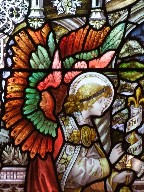 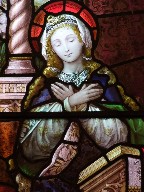 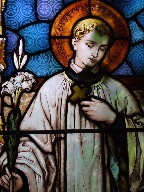 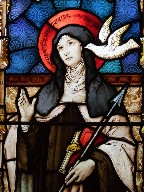 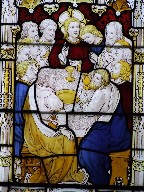
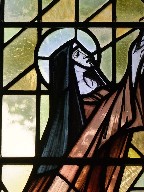 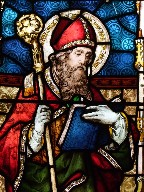
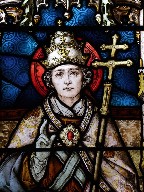 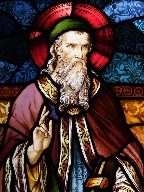 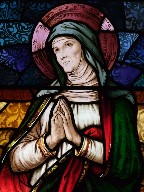
The two
aisles end in chapels, and it is in the Blessed Virgin
Mary chapel at the east end of the south aisle that
you'll find the Annunciation window. The chapel at the
east end of the north aisle contains the Sacred heart
altar, and a great curiosity, a figure brass to an
earlier Priest of the parish.
| St
Mary was built in the late 1840s to the designs
of the local architect JJ Scholes, who had
recently suffered the embarrassment of his
suspension bridge across the Bure collapsing. A
crowd had gathered on it to watch a Norwich-based
clown float down the river in a barrel pulled by
geese (I kid you not). The crowd on the bridge
rushed from one side to the other as the clown
passed beneath, and the sudden transference of
weight caused the bridge cables to snap and
deposit the watchers in the river. It was never
known how many people died, because the strong
current must have washed some of them out to sea.
About seventy bodies were recovered, most of them
children. A gravestone outside the south transept
of nearby St Nicholas remembers one of them in
rather spectacular fashion. The accident doesn't
seem to have put Scholes off, or the
commissioners of St Mary for that matter, and in
fairness to the architect it was found that the
contractors had built the bridge wider than
Scholes had specified as a safe limit. And St
Mary is still standing these 160-odd years later,
of course. As you leave, you'll spot
the most modern window in the church, in the
north aisle. It depicts Mary appearing to St
Bernadette at Lourdes, an event which hadn't even
occured when this church of St Mary first opened
its doors to Great Yarmouth's poor Catholics,
many of them probably Scottish herring girls of
about the same age as Bernadette.
|
|
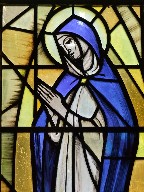 |
|
|
|
